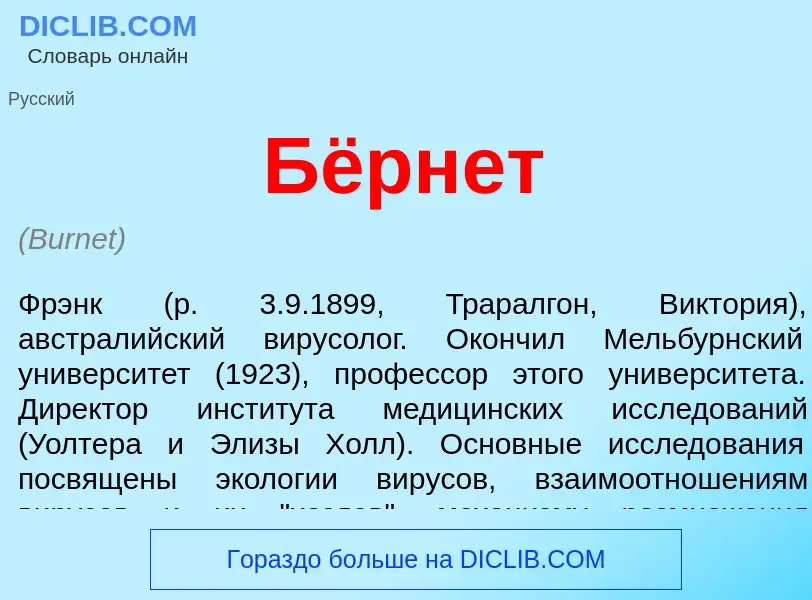Enter a word or phrase in any language 👆
Language:
Translation and analysis of words by artificial intelligence
On this page you can get a detailed analysis of a word or phrase, produced by the best artificial intelligence technology to date:
- how the word is used
- frequency of use
- it is used more often in oral or written speech
- word translation options
- usage examples (several phrases with translation)
- etymology
What (who) is Бёрнет - definition
СТРАНИЦА ЗНАЧЕНИЙ
Бёрнет
Бёрнет
(Burnet)
Фрэнк (р. 3.9.1899, Траралгон, Виктория), австралийский вирусолог. Окончил Мельбурнский университет (1923), профессор этого университета. Директор института медицинских исследований (Уолтера и Элизы Холл). Основные исследования посвящены экологии вирусов, взаимоотношениям вирусов и их "хозяев", механизму размножения вирусов, их изменчивости. Впервые изучил возбудителя ку-лихорадки, которому присвоено его имя (Rickettsia burneti). Вирусные болезни человека Б. рассматривает с эволюционной и экологической точек зрения. Нобелевская премия по физиологии и медицине (1960).
Соч.: Viruses and man, L., 1953; Principles of animal virology, N. Y., 1955; Integrity of the body, Camb. (Mass.), 1962; в рус. пер.- Вирус как организм, М., 1947.
БЕРНЕТ
Е. (наст. имя Александр Кириллович Жуковский) (1810-64), русский писатель, поэт. Представитель романтизма послепушкинского периода. Поэмы "Вечный жид" (1839), "Чужая невеста" (1843). Повести.
---
(Burnet) Фрэнк (1899-1985) , австралийский вирусолог и иммунолог. Описал возбудителя ку-лихорадки. Труды по экологии вирусов. Один из авторов т. н. клонально-селекционной теории иммунитета. Исследовал механизмы аутоиммунных болезней. Нобелевская премия (1960, совместно с П. Б. Медаваром).
---
(Burnet) Фрэнк (1899-1985) , австралийский вирусолог и иммунолог. Описал возбудителя ку-лихорадки. Труды по экологии вирусов. Один из авторов т. н. клонально-селекционной теории иммунитета. Исследовал механизмы аутоиммунных болезней. Нобелевская премия (1960, совместно с П. Б. Медаваром).
Бернета риккетсия
(Coxiella burneti, Ber; F. М. Burnet; син. риккетсия Ку-лихорадки) вид микроорганизмов рода Coxiella (сем. Rickettsiaceae, порядок Rickettsiales); мелкие грамотрицательные палочки, длительно сохраняющиеся в окружающей среде, культивируемые в желточном мешке куриных эмбрионов; возбудитель Ку-лихорадки.

